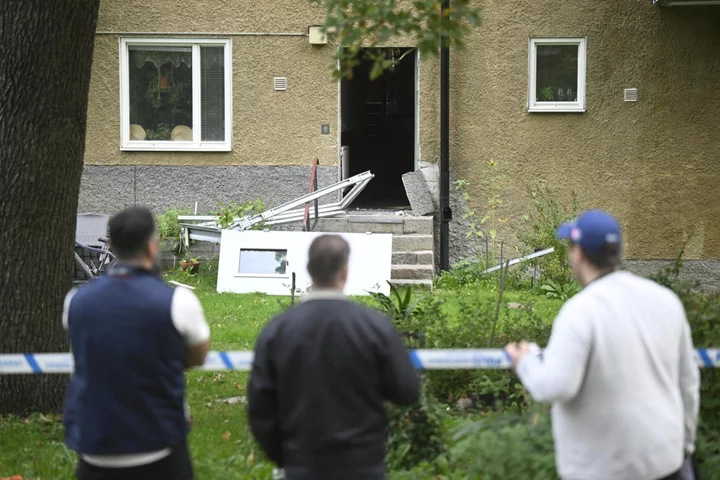
Child soldiers, executions, bombs: Deadly gang violence grips Sweden
Linda, a Swede in her forties, is standing in the doorway with her children. She looks visibly upset and tired. “I didn’t sleep much last night, I can’t take it anymore,” she tells The Independent. “The murders, the bombs, the constant police presence on the ground and police helicopters in the air. Me and my children need to get out of here. We need to move.” Linda lives in a block of flats in Hasselby, a suburb west of Stockholm, where a bomb exploded on September 25. Now, the day after, there is debris and broken glass everywhere. The bombed-out apartment next door is cordoned off. Police are still searching the premises. “I was in my home on Monday night,” says Linda. “Luckily, the children were not home yet. I heard a massive blast and then loud screaming. I ran into the street and could hear the moans of a man inside the flat that had been hit. Police arrived and took him and two other injured away.” The bloody gang war in Sweden has further intensified this week, with 11 killed this month alone. On Wednesday evening, a 20-year-old woman died in Uppsala, north of Stockholm, after an explosion ripped through the house she was staying in. She was not connected to the feud. Two young men also died from their wounds after being shot south of the capital. ‘It’s like a war zone’ Like several others in Hasselby, Linda doesn’t want her family name published in the newspaper. There is a fear of reprisals from the violent gangs that terrorise many Swedish cities. In 2022, there were 391 shootings in Sweden, 62 of which were fatal, making Sweden the gun murder capital of Europe. “I am not so worried about my girls, but I do worry about the boys. My oldest is thirteen. I need to protect him. He can’t get involved in this terrible gang war,” says Linda. Hasselby Strand mainly consists of modern flats, highrises, and other three-storey buildings like Linda’s. Children are playing football on the floodlit pitch a few hundred metres away. A father and his son are out walking their dog. “Hasselby was a wonderful place to live, only 30 minutes from the centre of Stockholm. Here we have the sea, it is green and leafy, and we used to love it here. I have lived in Hasselby Strand since 1995, but then the foreigners started coming,” Erik Petterson tells The Independent. “Don’t get me wrong, I am not a racist, but there is no way around it. The trouble started when more and more migrants came to Hasselby. Now it is like a war zone. It is like a bad dream, a nightmare.” The story repeats itself in most Swedish cities. Almost every day, there are new stories from the brutal gang war. The uneasiness in talking about migrants and foreigners is notable when speaking to locals in Stockholm. Sweden was, for many years, one of the most welcoming countries in Europe in opening its borders to migrants. The number of foreigners has increased dramatically. In 2012, 1.47 million inhabitants had been born outside Sweden. This number increased to 2.15 million by 2022. Foreign-born citizens made up around 20 per cent of the population of Sweden in 2022, according to Statista, quoting figures from Sweden’s statistics office. “Now, everything has changed. Sweden has changed. I don’t recognise the Sweden I knew anymore. And the violence seems to be spreading everywhere. It feels like it is getting closer and closer,” says Katarina Lindgren, a woman walking with her friend in central Stockholm. Blaming migration ‘an oversimplification’ Politically, Sweden has taken a sharp turn to the right. In the 2022 general election, the nationalist right-wing populist party, the Sweden Democrats (SD), got 20 per cent of the vote, becoming Sweden’s second-biggest party. SD is backing the centre-right coalition government through a supply and confidence deal. SD is strictly anti-immigration, and Sweden is tightening its migration policies dramatically in line with the hardline stance taken in neighbouring Denmark with some of Europe’s most restrictive migration laws. However, according to Manne Gerell, a leading Swedish criminologist from Malmo University, the clampdown on migration to solve the gang wars is a politically motivated oversimplification. “There is no doubt that immigration and bad integration are part of the problem, but it is not the whole story. Look at Germany, for instance. They have received a lot of migrants recently, but there is no rise in gun violence there. If it were a simple linear equation that more migrants equals more violence, you would expect German gun violence to follow the pattern of Sweden, but it is not,” he tells The Independent. Surprisingly, part of the explanation for the spread of gang violence in Sweden might lie in a successful police operation. In 2020, French police broke the codes of criminal communications network EncroChat. This enabled police all over Europe to follow crimes and the people behind them online in real time, leading to thousands of arrests across Europe. More than 400 criminals in Sweden were arrested. The resulting convictions saw sentences totalling more than 1,500 years in prison. The head of the Swedish gangs was, so to speak, cut off, but the outcome was not what was expected. “Instead of the underworld calming down, the arrests led to chaos, where very young gang members are now fighting for dominance of the lucrative drugs market. The fact that there is no real mafia tradition in Sweden means there was no one to put the lid on the kettle, and now we have headless chickens running around with automatic weapons shooting each other,” says journalist Diamant Salihu, who has written several books about the escalating gang violence in Sweden. “Right now, we have child soldiers being used to shoot people and plant deadly explosives. There is a war between two rival gangs, but also a war between the leaders of one gang [the Foxtrot network], where one of the gang leaders is in Turkey pulling the strings on who the child soldiers should target. The war has escalated so the child soldiers now go after family members and friends,” he says. In September alone, there have been dozens of incidents. A 13-year-old boy was found executed in the woods close to Stockholm, and the mother of a gang member was killed. Sweden’s justice minister, Gunnar Strommer, describes the escalation of the gang war as “domestic terrorism”. “There are many roots in the Swedish tree that are rotten,” says Mr Salihu. “Failed integration and segregation are to blame, but so is very ineffective policing. Only between 20–25 per cent of these gun crimes are solved. This makes it easier for the gangs to recruit more children and turn them into criminals and killers.” Swedish police say they are fighting an uphill battle against a ruthless enemy of the state. “The situation is reminiscent of low-intensive warfare,” says Jale Poljarevius, police chief and head of intelligence for the area surrounding Stockholm and Uppsala. “Organised crime groups [OCGs] are using military weapon systems [automatic guns], explosives and hand grenades. “If they can’t get to their target, they attack their families. Sometimes the attacks result in death or injured innocent victims, just like victims of war. “Since 2018 Sweden has the highest death rates in Europe, among the population of 15- to 29-year-olds.” Swedish peculiarity Gangs in Sweden used to be a regional problem, but it has turned into a national plague. Sweden used to be a very inclusive society, where almost everybody bought into the idea of togetherness in an egalitarian way. The state still plays an unusually controlling role in, for instance, keeping checks on how much alcohol its citizens consume. In Stockholm, most people wait for a green light before crossing the road, even when there are no cars. Everybody is supposed to play their part in the Swedish puzzle. But as more migrants came to Sweden, little was done to ensure they felt part of this society. In Hasselby, there is a part of town with big houses where the well-to-do, mostly white Swedish people, live and another that is much poorer. According to Lisbeth, who The Independent talks to on the train to Hasselby, the two rarely mix. “Both the Conservatives and the Social Democrats who have governed Sweden for decades have been passive bystanders to an ever-evolving problem of segregation and lack of integration. Maybe it is not the migration, but the lack of planning for a new society that is the culprit,” said Mr Salihu, who himself has Albanian roots. The Scandinavian model of a fair and progressive society has been exported to countries worldwide and was, for instance, a big inspiration behind Tony Blair’s New Labour movement. But the Swedish model is now under threat from within. For Linda and her children in Hasselby, the only way is out. “I don’t know where we will go”, she says, “but I can’t live like this. Before the bomb we had a murder in our highrise. This is no longer a good place to live.” Read More Three killed in shootings and explosion in Sweden as deadly gang feud escalates A shooting in a pub in Sweden has killed 2 men and wounded 2 more, police say. Teenager is latest victim in spate of deadly shootings across Sweden Three killed in shootings and explosion in Sweden as deadly gang feud escalates ‘National retrofit mission’ urged to better insulate Britain’s leaky homes Deadly violence continues in Sweden. 3 people killed in overnight shootings and an explosion
2023-09-28 23:56

Swiss glaciers get 10% smaller in two years
The ice fields have lost as much volume in two years as they did in three decades from 1960 to 1990.
2023-09-28 23:48
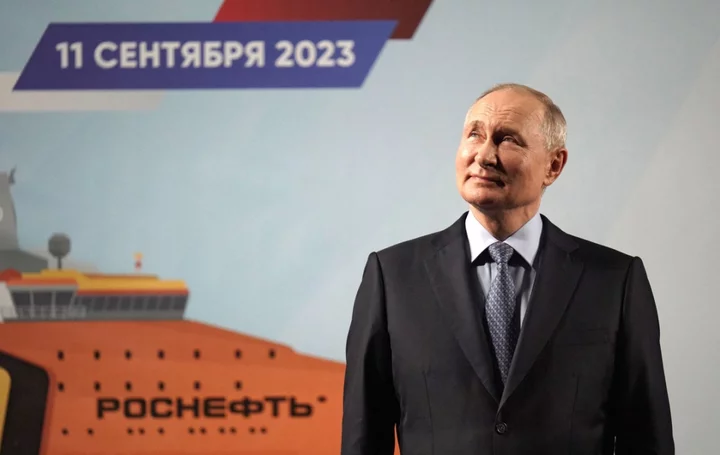
Putin’s shameless UN charm offensive - with stolen grain from Ukraine
A desperate Vladimir Putin, increasingly isolated on the world stage, is eyeing a return to the UN Human Rights Council – and he has launched a shameless charm offensive to get him there. Armed with stolen Ukrainian grain, the Russian president is on a mission to curry favour with potential backers ahead of a vote for council membership next month, although his efforts are likely to fall short. Two years after being kicked off the panel for invading its neighbour, Putin has ordered his diplomats to try and secure the backing of enough countries for Moscow to beat two other eastern European nations on 10 October. A Russian position paper circulated to dozens of other countries ahead of the vote strikes a markedly different tone to the nuclear threats and wartime sabre-rattling of Putin’s addresses since he invaded Ukraine, calling for “constructive mutually respectful dialogue” and referring to the 47-member Human Rights Council as “a key body in the United Nations system”. Russia is competing with Albania and Bulgaria to win one of two spots up for grabs on the council that are reserved for central and eastern European nations. Ironically one of the countries being replaced is in fact Ukraine – its and the Czech Republic’s terms are expiring. Moscow is going all out to try and reverse the April 2022 vote that saw it booted, experts tell The Independent. Then, 93 countries voted in favour of suspending Russia, while 24 voted against and 58 abstained. “Russia is apparently offering incentives such as grain and arms in exchange for votes. Along with other moves to deepen relations with Africa, we know that President Putin had already promised African states grain back in July at the Russia-Africa Summit,” says Yousuf Syed Khan, a senior lawyer at international human rights firm Global Rights Compliance. “At the same time, Russia is engaged in the systematic pillage of Ukraine’s grain, having rebuilt infrastructure to harness the ability to export millions of tonnes from occupied Ukrainian territory into Russia. This is not a coincidence,” the war crimes lawyer adds. Russia has been accused of weaponising global food security in its war against Ukraine, targeting key Ukrainian infrastructure with missile strikes while at the same time pulling out of a UN-brokered deal that had allowed Kyiv to keep exporting grain to other parts of the world where rising food prices are pushing more people into poverty. “The bottom line is that Russia is in no better standing to join the Human Rights Council now than it was nearly 18 months ago when it was voted off. In many ways, its bid to re-join and the outcome of the vote will be a barometer of Russia’s international standing,” Khan says. Alongside what it can offer in terms of trade, Khan says Russia will likely try to convince smaller countries that they do not want to be “instrumentalised to serve the political wills of Western nations”. “This logic may speak to some of the African States that Russia will desperately need to vote in its favour,” he tells The Independent. This tallies with the language in the position paper Russian diplomats have already distributed. The paper says Moscow “believes it is important to prevent the increasing trend of turning the Human Rights Council into the instrument, which serves political wills of one group of countries punishing non-loyal governments for their independent internal and external policy,” reported CNN. Alfred de Zayas, a former independent UN expert on human rights, says he believes the odds are stacked against Russia rejoining the council, despite the concerns voiced in recent days by Western officials. “At present, there are five eastern European states represented in the council – Czechia [the Czech Republic], Georgia, Lithuania, Montenegro and Ukraine. The terms of Czechia and Ukraine expire in December 2023. There are two openings but three candidates – Albania, Russia and Bulgaria,” he tells The Independent. De Zayas says that there was little in Russian foreign minister Sergei Lavrov’s recent comments at the UN General Assembly in New York to suggest a rapprochement with “the collective West” is any nearer. But at the same time, he argues that including Russia on multilateral platforms like the Human Rights Council is exactly what is needed to work towards peace talks to end the Ukraine war. “Maximum inclusiveness, bringing in as many countries as possible would be desirable, so that meaningful exchanges of ideas and perspectives could be conducted. Excluding Russia is counterproductive because it closes an important avenue of compromise and quid pro quo,” says De Zayas. “Precisely because there is a war going on, it is crucial to take advantage of every forum of dialogue,” he suggests. For Khan, however, Russia’s ongoing abuses in Ukraine are likely to see Putin’s charm offensive fall short. “Since the initial days of its full-scale invasion in February last year, Russia has been engaged in starvation as a method of warfare across Ukraine,” he says, recounting Moscow’s significant human rights violations during the conflict. “Unlawful conduct includes the laying of sieges to areas such as Chernihiv and Mariupol while denying access to even the most basic items required for civilian survival such as food, medicine and potable water. “More recently, we have seen Russia attacking grain ports along the Danube, forcing Ukraine to pivot to the Sulina Channel with its exports and to work with Romania, to elicit sanctions relief for Moscow. Russia also destroyed at least 270,000 tonnes of grain in late July and early August alone. None of this is being done with any valid military objective.” The latest report by Mariana Katzarova, the UN’s special rapporteur on Russia’s rights situation within its own borders, noted that rights have been on a “steady decline” over the last two decades but things have “significantly deteriorated since its invasion of Ukraine in February 2022”. Mass arbitrary arrests, detentions and harassment were recorded for “anyone speaking out against Russia’s war on Ukraine or daring to criticise the government’s actions,” the report found. The UN’s website says that “with membership on the [Human Rights] Council comes a responsibility to uphold high human rights standards”. “One would hope that all nations vote in line with the HRC membership criteria,” says Khan, who has worked with the UN for a decade on atrocity inquiries, adding that on this point Russia is falling far short. Read More Ukraine-Russia war - live: ‘Nuclear crisis’ warning over Putin-controlled power plant on the frontline Russia tries to rejoin UN Human Rights Council Russia ‘weaponised food and deliberately caused starvation’ in Ukraine Ukraine repels Russian attacks as Putin’s forces try to recapture territory lost in counteroffensive
2023-09-28 22:22
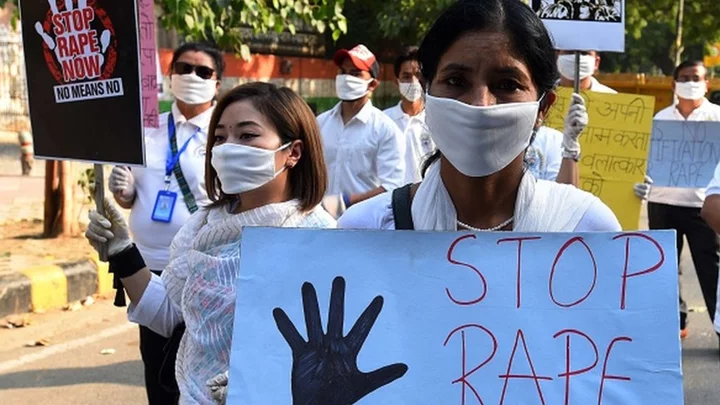
Ujjain: India anger as minor rape victim walks around for help
CCTV footage of a young girl walking around a street reportedly asking for help surfaced online this week.
2023-09-28 16:46
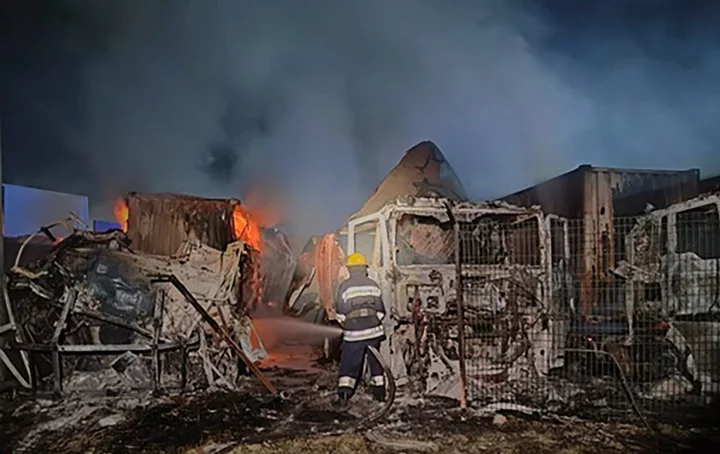
Ukraine war – live: Russia launches over 40 drones in overnight attack from Black Sea
Ukraine says its air defences shot down 34 kamikaze drones this morning and overnight as Russia launched a major new wave of air strikes across the country. Russia’s attacks involved at least 44 Iranian-made Shahed drones in total, according to Ukraine’s Air Force. “Fighter aircraft, anti-aircraft missile units and mobile fire groups were engaged to repel the attack,” Ukraine’s military said on Telegram. A large number of the drones were fired on southern Ukrainian cities from the Black Sea, the air force said. It comes as Kyiv said hundreds of fighters from the Wagner mercenary group have returned to Ukraine to fight in Russia’s continuing invasion for the first time since the group’s leader Yevgeny Prigozhin died in August. The Ukrainian military said it had seen “no significant impact” on frontline dynamics from Wagner’s return to the battlefield, however. Earlier, there were reports that a fresh offensive by Russia’s forces in the coming weeks is “unlikely”, according to British intelligence. Britain’s Ministry of Defence reported that patterns in Russian deployments suggest that Vladimir Putin’s troops are “overstretched” across the frontlines in Ukraine. Read More Viktor Sokolov seen for second time in newly emerged video as he claims Russia’s Black Sea Fleet ‘performing successfully’ New video of ‘dead’ Russian Black Sea fleet commander raises doubts over Ukraine’s claim Hillary Clinton mocks Putin over Nato expansion: ‘Too bad, Vladimir. You brought it on yourself’ Ukrainian forces ‘enjoy success’ near Bakhmut as Putin deploys reserves
2023-09-28 14:54
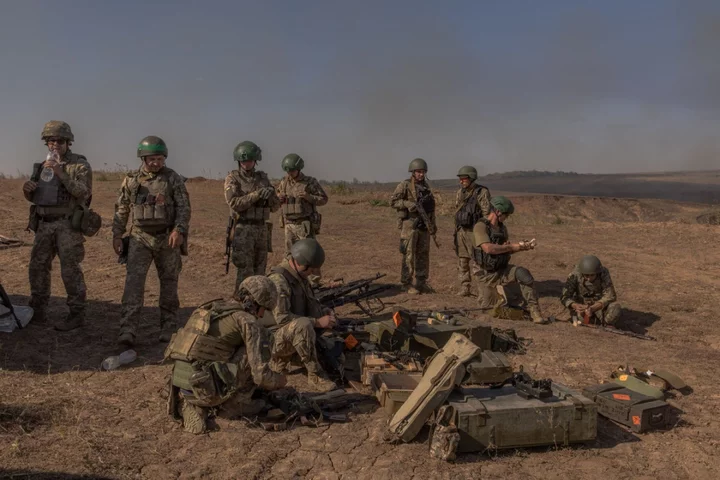
Ukraine repels Russian attacks as Putin’s forces try to recapture territory lost in counteroffensive
Ukrainian soldiers fought off fierce Russian attacks on the battlefield on Wednesday as the invading troops continued to recapture lost territory in eastern Ukraine, military officials said. Some progress was also seen in southern Ukraine – another pocket of heavy territorial battle in Russia’s 20-month-old invasion. "We continue to repel intense enemy attacks near Klishchiivka and Andriivka. The enemy is still storming these positions with the hope of recapturing lost positions, but without success," Ilia Yevlash, a spokesperson for Ukraine‘s eastern group of forces, told national television. The two villages – Klishchiivka and Andriivka – near Bakhmut were retaken from Russian control in mid-September in a span of three days, marking a significant territorial feat in the Ukrainian counteroffensive. There had been 544 Russian shelling incidents in the past 24 hours in the area, seven combat clashes and four air attacks, the military spokesperson said. Officials, including president Volodymyr Zelensky, also confirmed advances in the fighting. “True Ukrainian fury against the occupiers in our Donetsk region! The Bakhmut direction, including fierce battles for Klishchiivka,” he said and mentioned “our advance in the Donetsk sector” in the east but did not share more details. Air strikes were also reported on four localities in the area by Ukraine’s General Staff who said 15 towns and villages had come under artillery and mortar attack in the past day. The heavy fighting in the region was also corroborated by Russia’s defence ministry who mentioned heavy fighting and said its forces had beaten back 10 attacks by Ukrainian troops near Klishchiivka and further south, near the village of Nevelske. In its next target on the battlefield, Ukrainian forces are eyeing several other villages as they progress through Zaporizhzhia region towards the major town of Tokmak. Military analyst Roman Svitan said there have been “three or four days of painstaking hard work by our assault group and commanders in the area which have led to very serious problems for the Russians”. "I would not speak of a breakthrough until we reach Tokmak." Tokmak, a Ukrainian city in south-central point in Zaporizhzhia oblast and just 12 miles from the frontline, is considered to be a critical mark in territorial fight which will give Kyiv’s forces a leverage to advance further and repel more Russian attacks. Ukraine fired its counteroffensive salvo in June to recoup ground in the east. Its forces are also trying to advance southward to the Sea of Azov to sever a land bridge established by Russia between the annexed Crimean Peninsula and positions it holds in the east. Read More Ukraine-Russia war – live: Fresh offensive by Putin’s troops ‘unlikely’ as frontline ‘over-stretched’ Russia airs ‘new interview’ of Black Sea admiral who Ukraine claimed was killed in strike New video of ‘dead’ Russian Black Sea fleet commander raises doubts over Ukraine’s claim Ukrainian forces ‘enjoy success’ near Bakhmut as Putin deploys reserves
2023-09-28 12:20
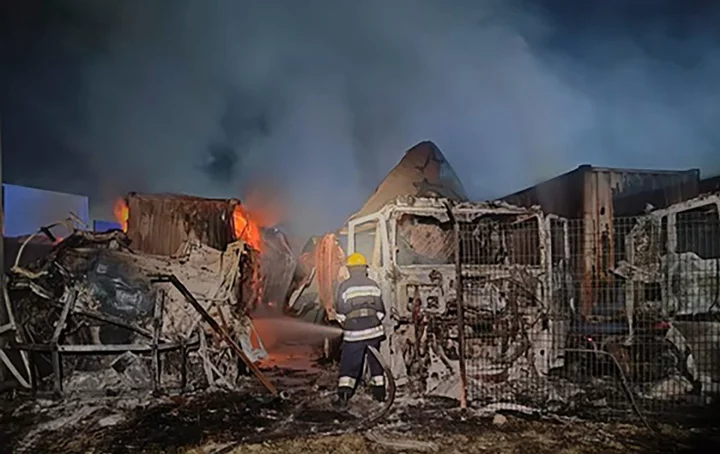
Ukraine-Russia war – live: Fresh offensive by Putin’s troops ‘unlikely’ as frontline ‘over-stretched’
A fresh offensive from Russia has been deemed ‘unlikely’ by the UK’s Ministry of Defence (MoD). In an intellegence update on Wednesday, the MoD reported that patterns in Russian deployments suggest that their frontline is “overstretched”. The MoD says that following the creation of Russia’s 25th Combined Arms Army (25 CAA), which was reportedly seen in Ukraine for the first time in August, Moscow has deployed them to reinforce under-defended areas on the frontline. New Russian units are reported to be fighting on the front in a sector west of Severodonetsk and Kreminna, along the border between Donetsk and Luhansk Oblasts, the MoD say. They suggest that this makes a fresh offensive from Russian forces unlikely, as they were not deployed en masse to one area. A statement from the MoD read: “Since the start of the invasion, Russia has only rarely maintained an uncommitted army-size grouping which could potentially form the basis of a major new offensive thrust. With 25 CAA apparently being deployed piecemeal to reinforce the over-stretched line, a concerted new Russian offensive is less likely over the coming weeks.” Read More Viktor Sokolov seen for second time in newly emerged video as he claims Russia’s Black Sea Fleet ‘performing successfully’ New video of ‘dead’ Russian Black Sea fleet commander raises doubts over Ukraine’s claim Hillary Clinton mocks Putin over Nato expansion: ‘Too bad, Vladimir. You brought it on yourself’ Ukrainian forces ‘enjoy success’ near Bakhmut as Putin deploys reserves
2023-09-27 22:50
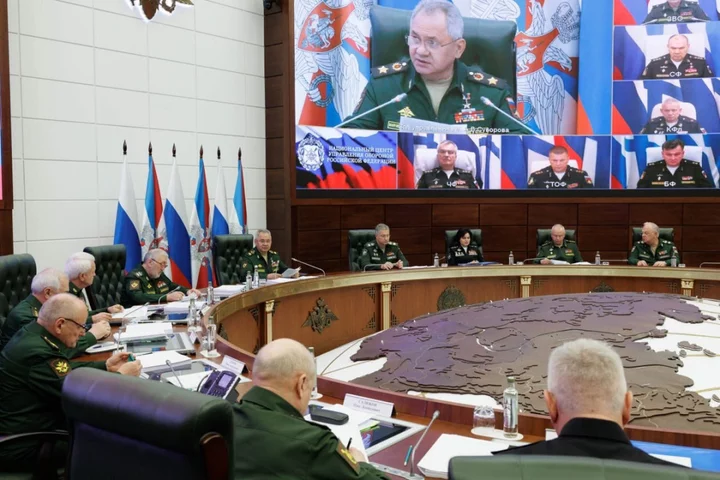
Russia airs ‘new interview’ of Black Sea admiral who Ukraine claimed was killed in strike
Russia has published a second clip purporting to show a top naval officer alive and well, after Ukraine claimed he had been killed in a missile strike on the headquarters of Moscow’s Black Sea Fleet in Crimea. Ukraine’s special forces claimed on Monday that the Russian fleet’s commander, admiral Viktor Sokolov, was among 34 officers killed in the huge strike on Sevastopol, which they said had caused irreparable damage to the headquarters building. But the military body backpedalled the following day, saying its units were “clarifying the information” which had been based on open sources, adding that many of those killed in the strike “still have not been identified due to the disparity of body fragments”. Kyiv’s special forces said the clarification came after Moscow was “urgently forced to publish an answer with an apparently alive Sokolov” – a reference to footage published by Russia’s defence ministry showing Mr Sokolov appearing on a video conference call with defence minister Sergei Shoigu. Admiral Sokolov is also seen on a video screen but in a different location, with only a flag seen in the backdrop behind him. He is also not heard speaking in the video. While this appears to be a signal from Moscow that the admiral is still alive, Russia has not released any details to prove when the video conference took place. In a further twist on Wednesday, Russian defence ministry-linked outlet Zvezda published footage it claimed showed Mr Sokolov speaking to reporters while attending an award ceremony for the Chernomorets Black Sea Fleet football team. But doubts were cast over whether the footage was new, given that Mr Sokolov made no reference to the Black Sea attack in his comments. “The Black Sea Fleet confidently and successfully fulfills the tasks assigned to it by the command,” he can be heard saying in the footage, adding that the exploits of Russia’s marines “practically do not appear on the screens of central television”. While Moscow has not commented directly on Mr Solokov’s status, defence ministry spokesperson Maria Zakharova claimed on Wednesday that there was “no doubt” the attack was “planned in advance using Western intelligence means, Nato satellite assets and reconnaissance planes”. The strike on annexed Crimea “was implemented upon of the advice of American and British security agencies and in close coordination with them”, Ms Zakharova claimed. Ukraine has previously refrained from directly claiming responsibility for strikes on targets in Crimea and Russia for fear of alienating Western allies concerned that such strikes could allow Moscow to claim them as evidence of Nato-sanctioned escalation. However, Kyiv has become bolder in claiming such attacks as part of its wider counteroffensive efforts in recent months, having increased its use of domestically-produced attack drones to strike targets in Moscow, Belgorod and Crimea. In its earlier update on the Sevastopol strike, Ukraine’s special forces said the air force fired 12 missiles on the Black Sea Fleet headquarters as it targeted areas where personnel, military equipment and weapons were concentrated. Two anti-aircraft missile systems and four Russian artillery units were hit, special forces said. Moscow-installed authorities in Sevastopol, annexed by Russia in 2014, are reported to be taking extra defensive measures in the face of Ukraine’s increased attacks on Crimea in recent days. Sevastopol is a critical region providing a platform from which Russia has launched many of its air attacks on Ukraine in the 19-month-long war. Read More Russia remains silent as Ukraine claims Black Sea Fleet commander among 34 officers killed Putin’s Black Sea fleet commander ‘killed in navy attack’ as Ukraine breakthrough triggers ‘panic’ Russia’s Lavrov rubbishes Ukraine peace plan and warns conflict will be resolved on battlefield Ukraine-Russia war – live: Putin planning new ‘assault units’ despite Moscow’s ‘mobilisation issues’
2023-09-27 22:47
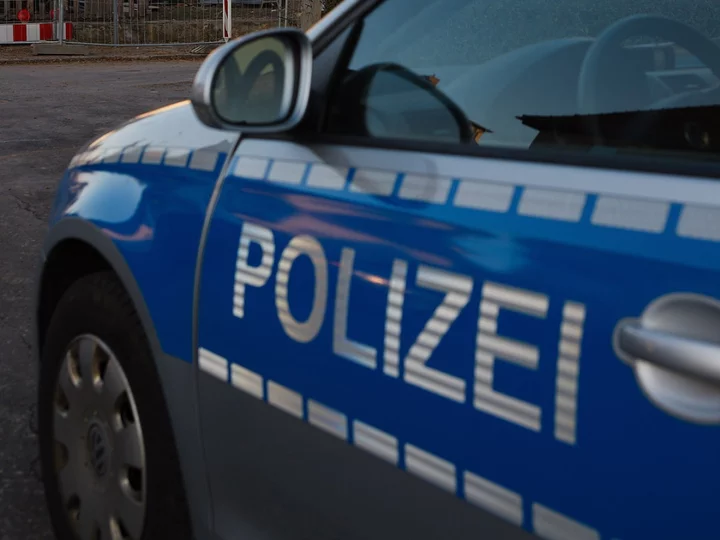
Dawn raids across Germany as neo-Nazi group banned for ‘disgusting’ targeting of children
Germany banned yet another neo-Nazi group and conducted raids at the homes of dozens of its members, according to reports. The authorities raided the houses of at least 39 members in the early hours on Wednesday after the country’s interior minister Nancy Faeser banned the group “Artgemeinschaft” accused of spreading Nazi ideology. Across 12 states, at least 26 homes belonging to the members of the group were searched. The authorities said that the group has about 150 members nationwide, including children and adolescents. “This is another hard blow against right-wing extremism and against the intellectual arsonists who continue to spread Nazi ideologies to this day,” Ms Faeser said. “This right-wing extremist group has tried to raise new enemies of the constitution with its disgusting indoctrination of children and young people.” This is the second neo-Nazi group to be banned in about a week. Ms Faeser banned “Hammerskins Deutschland” which had roots in the United States about a week ago. The Hammerskins Germany is an offshoot of the Hammerskins Nation founded in the United States in 1988, according to the German Interior Ministry. Local reports said that this organisation held a significant position within Europe’s right-wing extremist sphere. Across the globe, its members identified themselves as “brothers” who embrace a subcultural lifestyle. As per the ministry’s investigation, the group also regards itself as the vanguard within the right-wing extremist community. “The ban of the ‘Hammerskins Germany’ is a hard blow against organised right-wing extremism,” Ms Faeser said then. She added that the ban included the association’s regional chapters and its sub-organisation Crew 38. “With this ban, we are putting an end to the inhumane activities of an internationally active neo-Nazi association in Germany,” she added. “This sends a clear signal against racism and antisemitism.” The ban on the “Hammerskins Germany” marked the 20th instance of the German Interior Ministry banning a right-wing extremist organisation. “Right-wing extremism remains the greatest extremist threat to the basic democratic order in Germany,” Ms Faeser said. Meanwhile, “Artgemeinschaft” reportedly maintains eight regional “fellowships” and “circles of friends”, according to local media. It was reported that their children are brought up according to supposedly pagan customs and Germanic traditions. The organisation also bears the nickname “Germanic Religious Community of Essential Life” and describes itself as the “largest pagan community in Germany”, according to local reports. It was founded in 1951. Additional reporting with agencies Read More Canada's government calls on House speaker to resign over inviting a man who fought for a Nazi unit Opposition lawmakers call on Canada's House speaker to resign for honoring man who fought for Nazis German police raid locations across the country in connection with smuggling of Syrian migrants How white supremacist fight clubs are building covert far-right militias Putin sends troops to ‘overstretched’ frontline as Kyiv ‘digs in’ in Verbove - live Hillary Clinton mocks Putin over Nato expansion: ‘Too bad, Vladimir’
2023-09-27 16:27
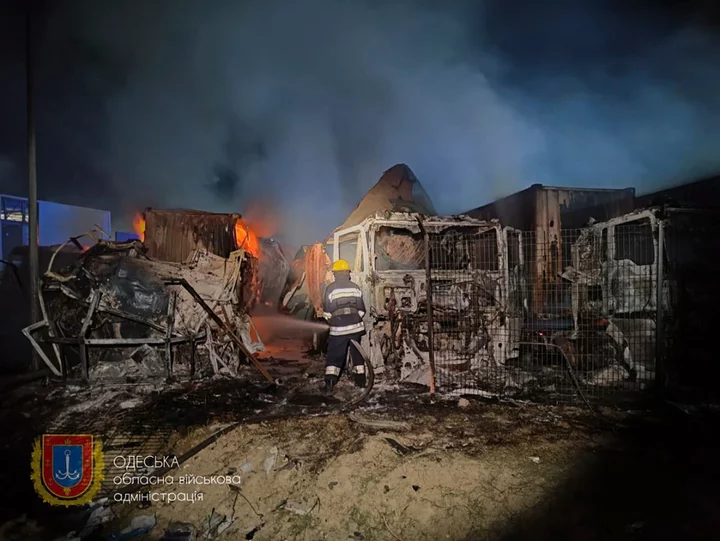
Ukraine-Russia war – live: Putin sends in new troops to ‘overstretched’ frontline as Kyiv ‘digs in’ in Verbove
Moscow has deployed more troops to their ‘overstretched’ front line, according to the UK’s Ministry of Defence (MoD). It comes as a Ukrainian military spokesman, Oleksandr Shtupun, told the news site Espreso TV that Ukrainian troops were digging in and poised to move on the village of Verbove as part of their advance to the Sea of Azov. The spokesman for troops in the south said: “I believe we will soon have good news.” The MoD says that following the creation of Russia’s 25th Combined Arms Army (25 CAA), which was reportedly seen in Ukraine for the first time in August, Moscow has deployed them to reinforce under-defended areas on the frontline. “[The] 67th Motor Rifle Division and 164th Separate Motor Rifle Brigade are reported to be fighting on the front in a sector west of Severodonetsk and Kreminna, along the border between Donetsk and Luhansk Oblasts,” the MoD said. They suggest that this makes a fresh offensive from Russian forces unlikely, as they were not deployed en masse to one area. The MoD said: “With 25 CAA apparently being deployed piecemeal to reinforce the over-stretched line, a concerted new Russian offensive is less likely over the coming weeks.” Read More Belarus' top diplomat says he can't imagine his nation entering the war in Ukraine alongside Russia Destruction in Ukraine’s eastern village of Klishchiivka captured in aerial footage Canada's government calls on House speaker to resign over inviting a man who fought for a Nazi unit Explosions from Russian drone attack on Odesa region seen from ferry on Danube
2023-09-27 15:24
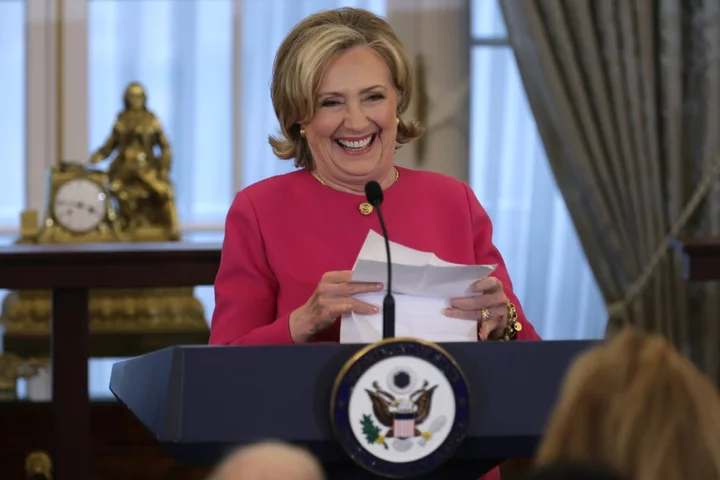
Hillary Clinton mocks Putin over Nato expansion: ‘Too bad, Vladimir. You brought it on yourself’
Hillary Clinton mocked Vladimir Putin on Tuesday for his concerns about Nato’s expansion and said the Russian president “brought it on himself” with his invasion of Ukraine. "Defending democracy in Ukraine, expanding Nato – just as an aside, too bad Vladimir, you brought it on yourself," the former US secretary of state said, prompting laughter and applause. Ms Clinton was speaking at the State Department where she unveiled her official portrait and addressed current and former officials in the ornate Benjamin Franklin State Dining room. "We always said, ‘people are not forced to join Nato. People choose and want to join Nato,’" she added. The top leader also took shots at the policies of Republican former president Donald Trump, who defeated her in the 2016 US presidential election. She added that there may have been questions raised on Washington’s ability to gather support for its aid for Ukraine to fend off Russian invasion due to Mr Trump’s legacy of alienating allies. "People might have doubted that because we had burned so many bridges with our allies and our friends," she said. "Reinstating a foreign policy... that actually brings people to us, not pushes them away, would have been thought to be extremely difficult. And indeed it was, but it was accomplished," she said and thanked her successor secretary of state Antony Blinken for "helping to restore America’s standing". Ms Clinton said the current Biden administration pursued many of the priorities of the Obama administration, in which she was the top US diplomat. Talking about the common Biden and Obama priorities, she described the mutual concerns of "expanding Nato, facing down Russian aggression and managing the challenges from China" as she took a dig at the Russian president who has long complained of Nato’s expansion in Europe and blamed it as a motive for his invasion of Ukraine. The top former official joked that it had been a long time since she had seen the portrait, which depicted her gazing into the distance against the backdrop of an enlarged American flag. "Between Covid, between not wanting to finish it during the prior administration," she said with a meaningful glance at the audience, drawing laughter, "it’s been a while. And I am going to be probably as surprised as all of you". Read More Ukraine-Russia war – live: Putin planning new ‘assault units’ despite Moscow’s ‘mobilisation issues’ Ukrainian forces ‘enjoy success’ near Bakhmut as Putin deploys reserves Hillary Clinton makes quip about Trump administration as her portrait is unveiled Donald Trump’s play for union votes leaves the GOP in a confusing spot once again
2023-09-27 14:58
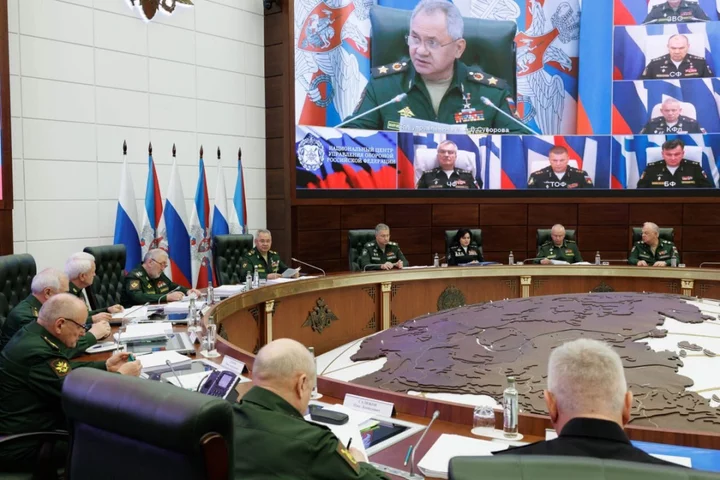
New video of ‘dead’ Russian Black Sea fleet commander raises doubts over Ukraine’s claim
A top Russian naval officer who Ukraine claimed was killed in a missile strike has been seen in a new video released by Russia, sparking confusion among the war-hit country’s officials. Ukraine’s special forces on Monday had claimed Russian admiral Viktor Sokolov and 33 other officers were killed in a missile strike carried out on the Black Sea Fleet’s headquarters in Sevastopol in Crimea. The video released by Russia’s defence ministry on Tuesday, however, showed Black Sea Fleet commander Sokolov appearing on a video conference call with Russian defence minister Sergei Shoigu. It remains unclear when the video was recorded. While it is not clear how Ukraine counted casualties in the Sevastopol operation, Anton Gerashchenko, an adviser to Ukraine’s minister of internal affairs, had earlier posted the admiral’s name and photo on social media. Ukraine now says it is working to “clarify” earlier reports. Russia has not issued any direct rebuttal of Ukraine’s claims, which is consistent with its stance of maintaining silence on significant battlefield losses. “As is known, 34 officers were killed as a result of a missile attack on the headquarters of the Black Sea Fleet of the Russian Federation. Available sources claim that among the dead was the commander of the Russian Army. Many still have not been identified due to the disparity of body fragments,” Ukraine’s special forces said on their official Telegram channel. “Since the Russians were urgently forced to publish an answer with an apparently alive Sokolov, our units are clarifying the information,” it said. The video from Tuesday showed defence minister Shoigu talking about a drill he claimed Russia’s Pacific fleet had completed a day earlier, as several top officers appeared on a big screen in the room. Admiral Sokolov is also seen in a video screen but in a different location, with only a flag seen in the backdrop behind him. He is also not heard speaking in the video. While this appears to be a signal from Moscow that the admiral is still alive, Russia has not released any details to prove when the video conference took place. In its earlier update on the Sevastopol strike, Ukraine’s special forces said the air force fired 12 missiles on the Black Sea Fleet headquarters as it targeted areas where personnel, military equipment and weapons were concentrated. Two anti-aircraft missile systems and four Russian artillery units were hit, special forces said. It was a rare direct claim of responsibility from Ukraine for an attack on either Russian soil or a target in Crimea, which Russia has occupied since its illegal annexation in 2014. Moscow-installed authorities in Sevastopol are reported to be taking extra defensive measures in the face of Ukraine’s increased attacks on Crimea in recent days. Sevastopol is a critical region providing a platform from which Russia has launched many of its air attacks on Ukraine in the 19-month-long war. Read More Russia remains silent as Ukraine claims Black Sea Fleet commander among 34 officers killed Putin’s Black Sea fleet commander ‘killed in navy attack’ as Ukraine breakthrough triggers ‘panic’ Russia’s Lavrov rubbishes Ukraine peace plan and warns conflict will be resolved on battlefield Ukraine-Russia war – live: Putin planning new ‘assault units’ despite Moscow’s ‘mobilisation issues’
2023-09-27 14:54
You Might Like...
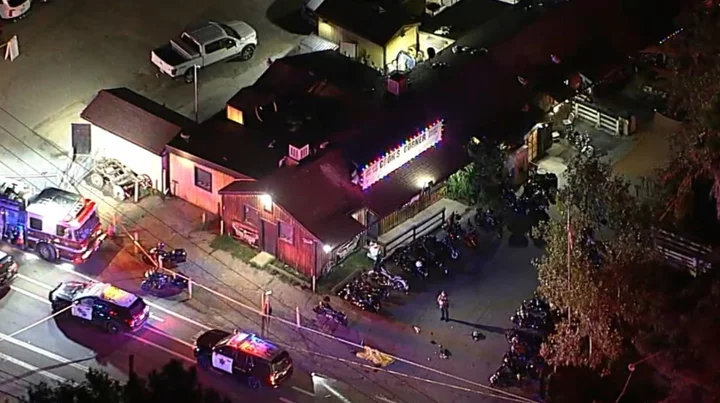
It began like any normal night at historic biker bar Cook’s Corner. It ended with a mass shooting
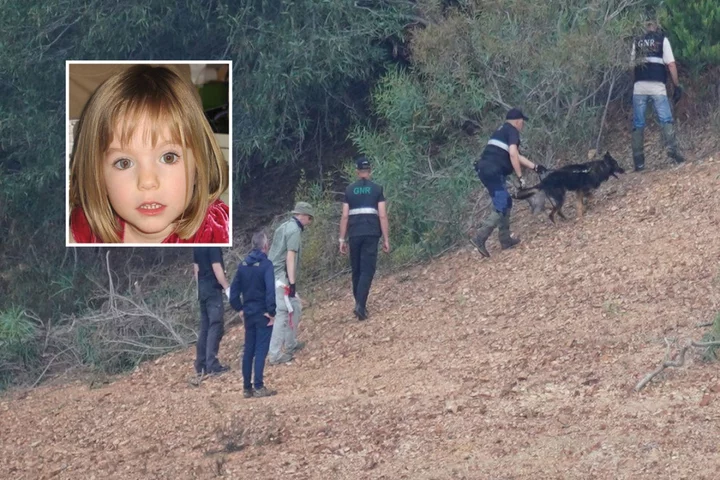
Detectives searching for Madeleine McCann give update after scouring reservoir
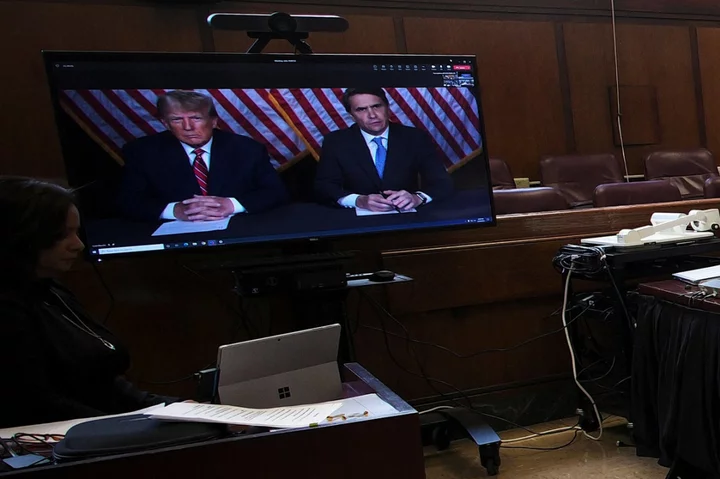
Trump news – latest: Mar-a-Lago worker makes shock claim about classified papers as Fox announces town hall
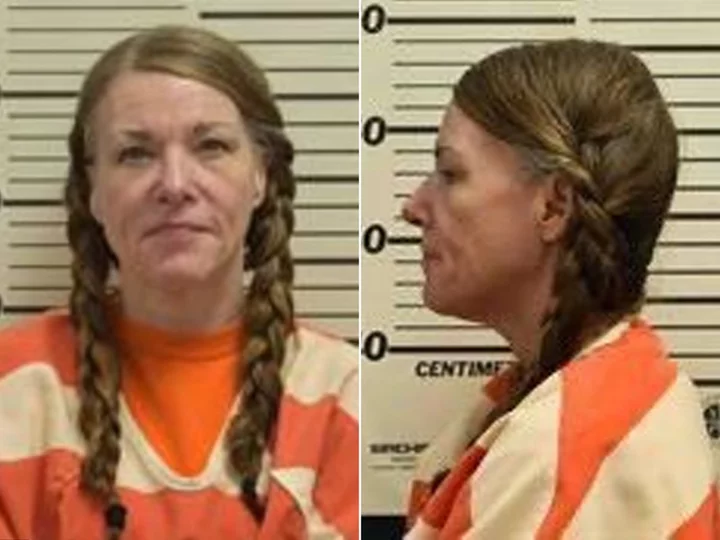
Lori Vallow verdict – latest: Idaho juror speaks out as ‘cult mom’ indicted in Arizona murder conspiracy
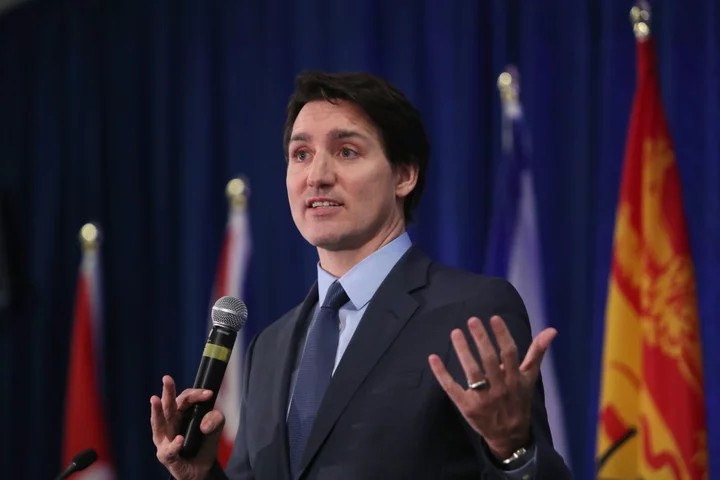
Canada Watchdog Rejects Call for Inquiry on China Meddling
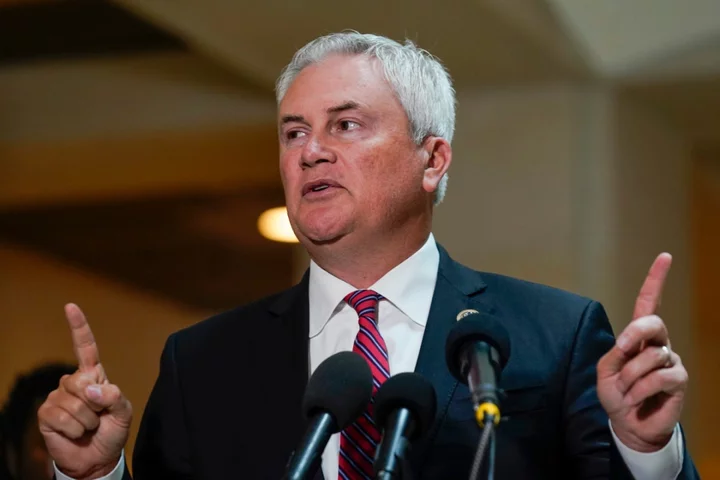
GOP cries foul over spy charges for Biden ‘whistleblower’
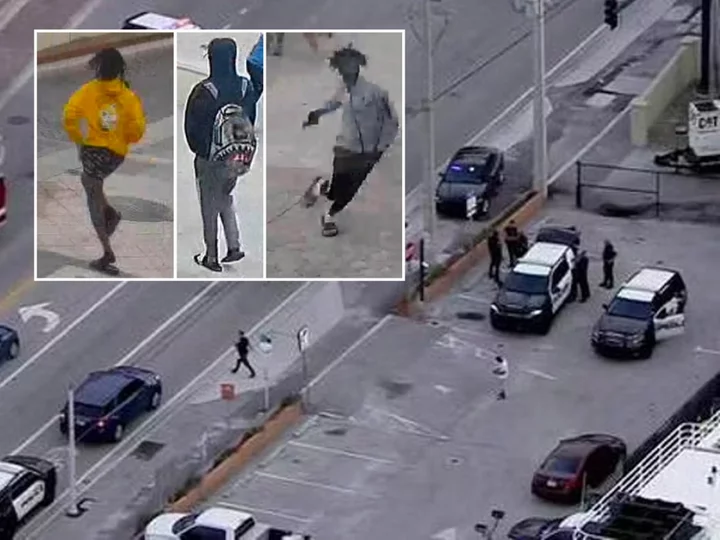
What we know about the three gunmen on the run and the two men arrested over Florida mass shooting
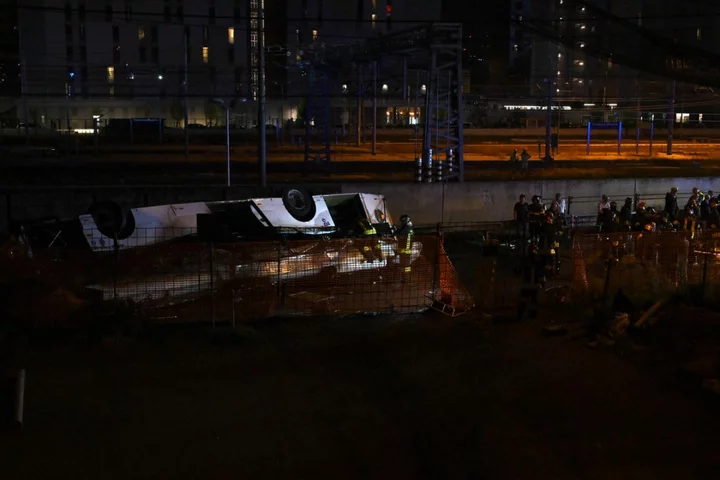
Bus plunges off bridge in Venice leaving more than 20 people dead - latest
